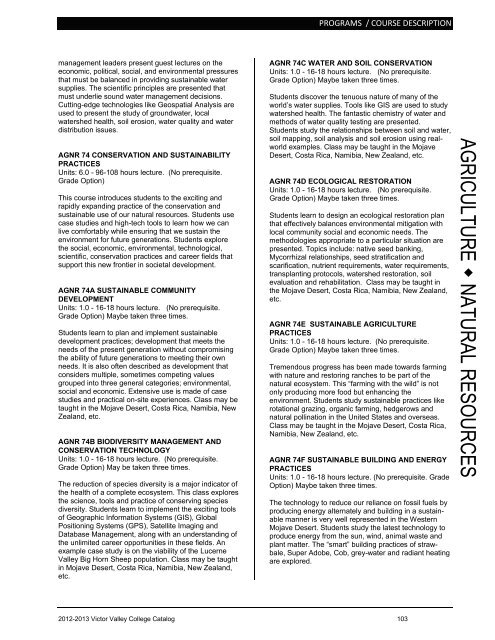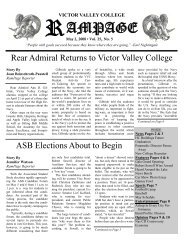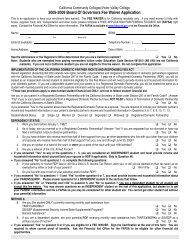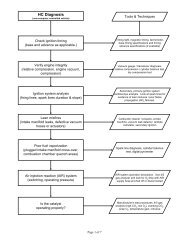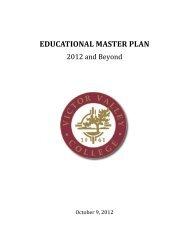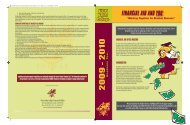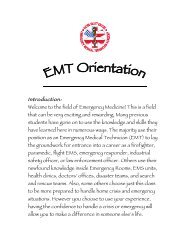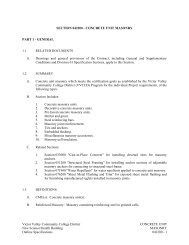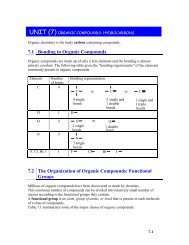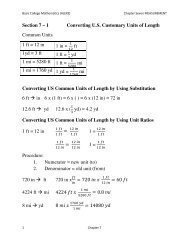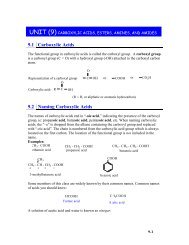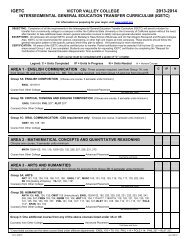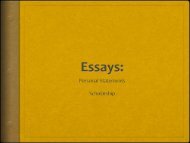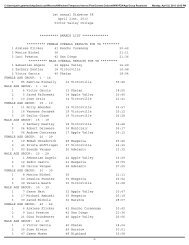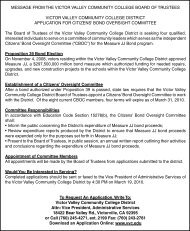Download - Victor Valley College
Download - Victor Valley College
Download - Victor Valley College
You also want an ePaper? Increase the reach of your titles
YUMPU automatically turns print PDFs into web optimized ePapers that Google loves.
PROGRAMS / COURSE DESCRIPTION<br />
management leaders present guest lectures on the<br />
economic, political, social, and environmental pressures<br />
that must be balanced in providing sustainable water<br />
supplies. The scientific principles are presented that<br />
must underlie sound water management decisions.<br />
Cutting-edge technologies like Geospatial Analysis are<br />
used to present the study of groundwater, local<br />
watershed health, soil erosion, water quality and water<br />
distribution issues.<br />
AGNR 74 CONSERVATION AND SUSTAINABILITY<br />
PRACTICES<br />
Units: 6.0 - 96-108 hours lecture. (No prerequisite.<br />
Grade Option)<br />
This course introduces students to the exciting and<br />
rapidly expanding practice of the conservation and<br />
sustainable use of our natural resources. Students use<br />
case studies and high-tech tools to learn how we can<br />
live comfortably while ensuring that we sustain the<br />
environment for future generations. Students explore<br />
the social, economic, environmental, technological,<br />
scientific, conservation practices and career fields that<br />
support this new frontier in societal development.<br />
AGNR 74A SUSTAINABLE COMMUNITY<br />
DEVELOPMENT<br />
Units: 1.0 - 16-18 hours lecture. (No prerequisite.<br />
Grade Option) Maybe taken three times.<br />
Students learn to plan and implement sustainable<br />
development practices; development that meets the<br />
needs of the present generation without compromising<br />
the ability of future generations to meeting their own<br />
needs. It is also often described as development that<br />
considers multiple, sometimes competing values<br />
grouped into three general categories; environmental,<br />
social and economic. Extensive use is made of case<br />
studies and practical on-site experiences. Class may be<br />
taught in the Mojave Desert, Costa Rica, Namibia, New<br />
Zealand, etc.<br />
AGNR 74B BIODIVERSITY MANAGEMENT AND<br />
CONSERVATION TECHNOLOGY<br />
Units: 1.0 - 16-18 hours lecture. (No prerequisite.<br />
Grade Option) May be taken three times.<br />
The reduction of species diversity is a major indicator of<br />
the health of a complete ecosystem. This class explores<br />
the science, tools and practice of conserving species<br />
diversity. Students learn to implement the exciting tools<br />
of Geographic Information Systems (GIS), Global<br />
Positioning Systems (GPS), Satellite Imaging and<br />
Database Management, along with an understanding of<br />
the unlimited career opportunities in these fields. An<br />
example case study is on the viability of the Lucerne<br />
<strong>Valley</strong> Big Horn Sheep population. Class may be taught<br />
in Mojave Desert, Costa Rica, Namibia, New Zealand,<br />
etc.<br />
AGNR 74C WATER AND SOIL CONSERVATION<br />
Units: 1.0 - 16-18 hours lecture. (No prerequisite.<br />
Grade Option) Maybe taken three times.<br />
Students discover the tenuous nature of many of the<br />
world’s water supplies. Tools like GIS are used to study<br />
watershed health. The fantastic chemistry of water and<br />
methods of water quality testing are presented.<br />
Students study the relationships between soil and water,<br />
soil mapping, soil analysis and soil erosion using realworld<br />
examples. Class may be taught in the Mojave<br />
Desert, Costa Rica, Namibia, New Zealand, etc.<br />
AGNR 74D ECOLOGICAL RESTORATION<br />
Units: 1.0 - 16-18 hours lecture. (No prerequisite.<br />
Grade Option) Maybe taken three times.<br />
Students learn to design an ecological restoration plan<br />
that effectively balances environmental mitigation with<br />
local community social and economic needs. The<br />
methodologies appropriate to a particular situation are<br />
presented. Topics include: native seed banking,<br />
Mycorrhizal relationships, seed stratification and<br />
scarification, nutrient requirements, water requirements,<br />
transplanting protocols, watershed restoration, soil<br />
evaluation and rehabilitation. Class may be taught in<br />
the Mojave Desert, Costa Rica, Namibia, New Zealand,<br />
etc.<br />
AGNR 74E SUSTAINABLE AGRICULTURE<br />
PRACTICES<br />
Units: 1.0 - 16-18 hours lecture. (No prerequisite.<br />
Grade Option) Maybe taken three times.<br />
Tremendous progress has been made towards farming<br />
with nature and restoring ranches to be part of the<br />
natural ecosystem. This “farming with the wild” is not<br />
only producing more food but enhancing the<br />
environment. Students study sustainable practices like<br />
rotational grazing, organic farming, hedgerows and<br />
natural pollination in the United States and overseas.<br />
Class may be taught in the Mojave Desert, Costa Rica,<br />
Namibia, New Zealand, etc.<br />
AGNR 74F SUSTAINABLE BUILDING AND ENERGY<br />
PRACTICES<br />
Units: 1.0 - 16-18 hours lecture. (No prerequisite. Grade<br />
Option) Maybe taken three times.<br />
The technology to reduce our reliance on fossil fuels by<br />
producing energy alternately and building in a sustainable<br />
manner is very well represented in the Western<br />
Mojave Desert. Students study the latest technology to<br />
produce energy from the sun, wind, animal waste and<br />
plant matter. The “smart” building practices of strawbale,<br />
Super Adobe, Cob, grey-water and radiant heating<br />
are explored.<br />
AGRICULTURE • NATURAL RESOURCES<br />
2012-2013 <strong>Victor</strong> <strong>Valley</strong> <strong>College</strong> Catalog 103


